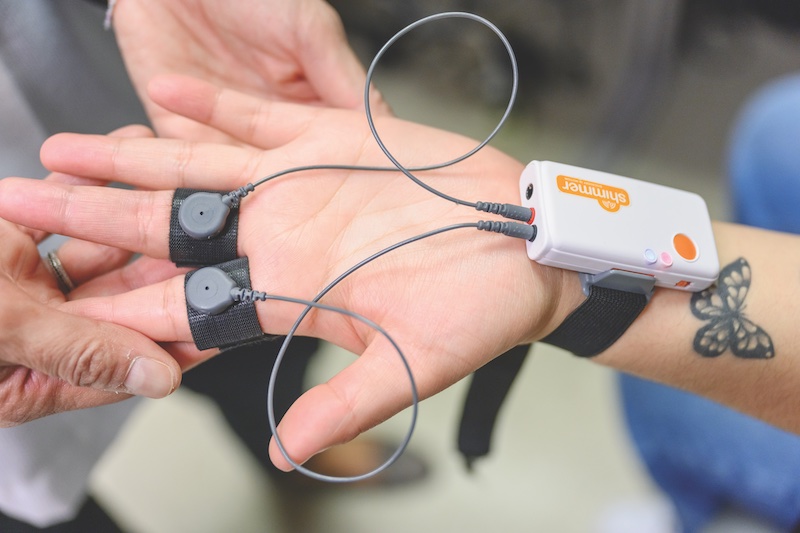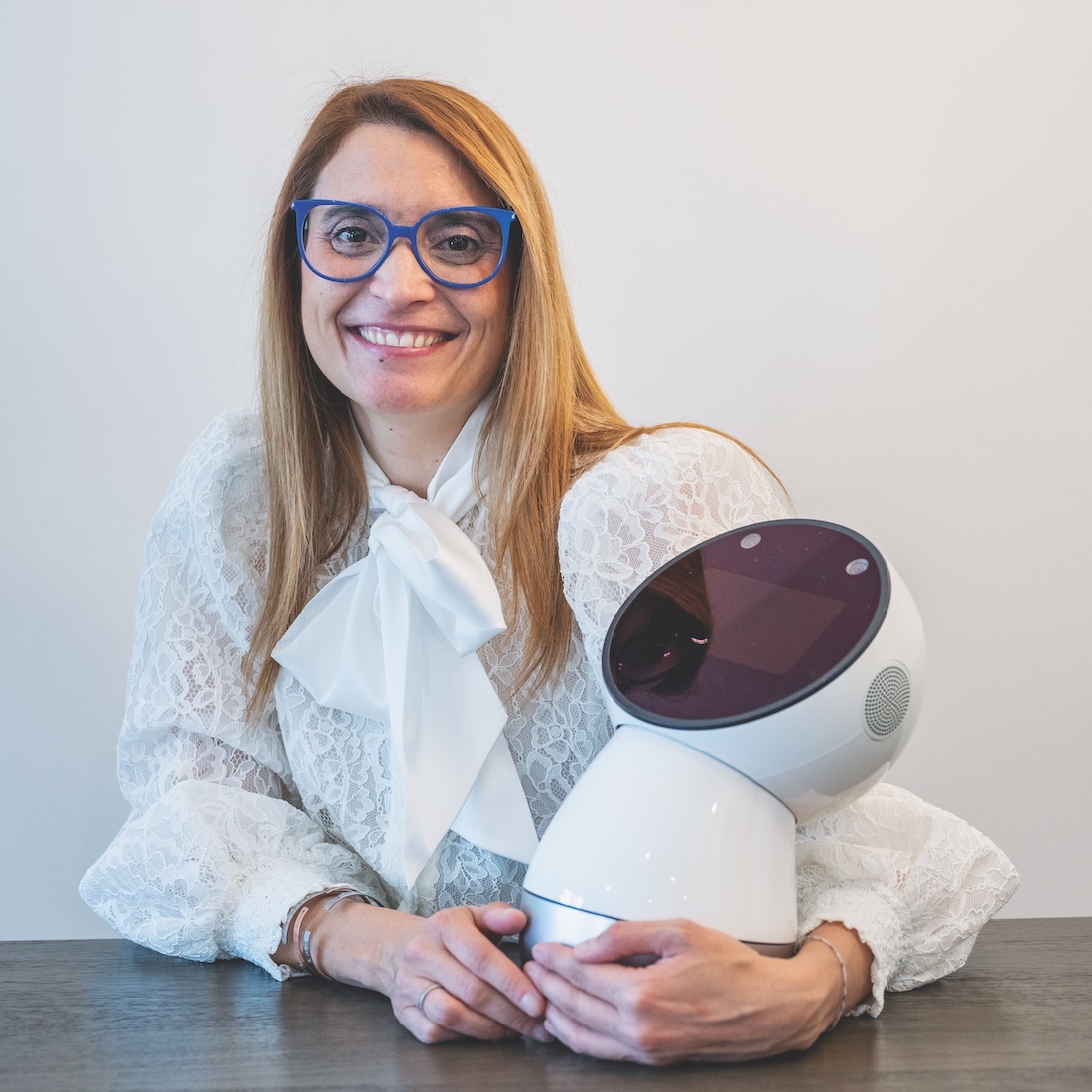
Marketing Professor Gaia Rancati, a worldwide expert on neuromarketing, with a portion of her 200-pair shoe collection (MTSU photo by Andy Heidt)
by Toni Shaw
Before switching careers to join academia, MTSU Professor Gaia Rancati worked professionally for several years in the premium-luxury retail sector for international fashion companies such as Max Mara, Value Retail, and Louis Vuitton.
Rancati took her love of fashion and marketing (and robots!) and carved out a space for herself as a worldwide expert in the field of neuromarketing.
Harvard Business Review defines neuromarketing as “the measurement of physiological and neural signals to gain insight into customers’ motivations, preferences, and decisions.” Such research on neuromarketing, retailing, services marketing, and artificial intelligence is crucial for informing companies about the most effective way to market products to consumers.
It’s neuromarketing behind the common strategy of pricing an item for 99 cents instead of $1 (or $99 instead of $100). It’s also neuromarketing that led the makers of Chips Ahoy cookies to replace their standard cookie picture on their packaging with one that is half-eaten with crumbs fallen to the side.
 The effectiveness of such strategies has its roots in the way researchers such as Rancati use neurotools that track eye movement, facial expressions, galvanic skin response, brain wave measurements, and heart rate to gain insights into advertising that moves people to action.
The effectiveness of such strategies has its roots in the way researchers such as Rancati use neurotools that track eye movement, facial expressions, galvanic skin response, brain wave measurements, and heart rate to gain insights into advertising that moves people to action.
How did Rancati find herself in such an interesting and relevant field for our times? “Everything started with a book,” she said.
According to Rancati, her decision to study neuromarketing “happened by chance,” the result of stumbling upon and reading The Trust Molecule by Paul Zak. Zak’s book explains that when there is trust, the brain releases oxytocin.
RANCATI TOOK HER LOVE OF FASHION AND MARKETING (AND ROBOTS!) AND CARVED OUT A SPACE . . . AS A WORLDWIDE EXPERT IN THE FIELD OF NEUROMARKETING.
Working in the fashion industry, Rancati realized that the relationship between the customer and the sales assistant requires a lot of trust, and that when it was present—and therefore so too was oxytocin—sales were more likely to occur.
Wanting to study more scientific and objective measures of buyer behavior, Rancati turned her academic and research efforts to neuromarketing.
GETTING A FOOT IN THE DOOR
In essence, neuromarketing is trying to figure out whether customers will pay attention to an ad or not. It’s a two-decade-old field of study, but questions persist about whether neuromarketing is ethical. The issue is how the science potentially gives brands an effective means to surreptitiously “push the buy button” in a customer’s mind, according to the American Marketing Association (AMA).

Neuromarketing research
In an interview with the AMA, Roger Dooley, author of Brainfluence: 100 Ways to Persuade and Convince Consumers with Neuromarketing, stated that most companies don’t intentionally promote anything that’s deceptive or illegal.
“The question runs along all advertising,” Dooley said. “Are you doing things in a way that is honest and helpful to the consumer? Things that are not going to do harm? Are you helping the consumer decide to buy something they’re going to regret? If so, it doesn’t really matter what you’re doing—whether a marketing study or using deceptive ad copy—you shouldn’t do it.”
RESEARCHERS SUCH AS RANCATI USE NEUROTOOLS . . . TO GAIN INSIGHTS INTO ADVERTISING THAT MOVES PEOPLE TO ACTION.
Rancati argues in favor of neuromarketing by stating one essential clear fact: Neuromarketing “is not able to read the minds of the customers. It is only able to show us there is a response to some stimuli that you receive from the environment.”
She describes neuromarketing as merely a tool, adding, “All tools depend on how we want to use them.”
According to Rancati, neuromarketing only crosses the line on ethics “if and when the nature of the research itself is unethical.”
WALK A MILE IN HER SHOES
Now a sought-after researcher and speaker in neuromarketing, Rancati has given a dozen presentations in her field of expertise over the last five years. She is an official speaker at the World Retail Congress and gives guest lectures at universities around the globe. She is also a valued member of the AMA and a guest judge for the AMA Undergraduate Research Competition.

Rancati with grad assistant Mayowa Isiolaotan in their neuromarketing research lab at MTSU’s Business and Aerospace Building (MTSU photo by J. Intintoli)
In 2019, Rancati was named a Woman of Excellence for her research on customer experience and retail at the World Women Economic Forum in New Delhi, India. She won the Best Paper Award at Convergence 2020: Winning through Service Excellence for “Robot-Human Interactions in Retail Stores: A Neuromarketing Perspective.”
At MTSU, Rancati said she is eager to help her True Blue colleagues learn how to use neuromarketing tools to improve their chances of publishing their own research. Utilizing many of the aforementioned technologies, Rancati said, she can gather physiological and neural signals and apply neuro- and cognitive science interpretations to try to make her colleagues’ research insights more salient.
Rancati’s climb from the fashion world to the halls of academia and cutting-edge research applications is impressive. For all that has changed in her life, though, including countries and professions, she said one thing has stayed the same: her love of shopping, particularly when it comes to collecting shoes and books.

Rancati with one of her two retail research robots (MTSU photo by Andy Heidt)
10 FAST FACTS ABOUT GAIA RANCATI
- Rancati’s research in neuromarketing specifically focuses on human-robot interactions, retailing, and augmented reality.
- Rancati attended IULM University in Milan, Italy, earning a bachelor’s degree in Marketing.
- Rancati earned a Master of Leadership and Management from Sole 24ORE Business School.
- Rancati earned a Ph.D. from IULM University in Marketing and Neuromarketing.
- While completing her doctorate, Rancati worked in the Center for Neuroeconomics Studies at Claremont Graduate University where her work centered around psychophysiology in retailing.
- Rancati joined MTSU in fall 2022 as an assistant professor of Marketing and Neuromarketing, teaching courses such as Principles of Marketing and Retailing and eCommerce.
- In addition to her position at MTSU, Rancati is a visiting assistant professor at her alma mater, IULM.
- Rancati coordinates the brand-new MTSU Neuromarketing Lab, the only lab in Tennessee that combines artificial intelligence, metaverse, and retail with neuromarketing. In this area, Rancati works with companies such as Lavazza, Hermes, and Tesla to improve the customer experience in retail and web applications.
- Rancati maintains long-lasting connections with these companies, facilitating collaborations between her MTSU students and the companies, as well as community-based projects and internships.
- Rancati continues to act as a consultant with luxury fashion companies on retail and sales operations.

COMMENTS ARE OFF THIS POST